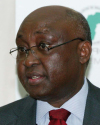
The president of the African Development Bank tells fDi how the global crisis is impacting upon the continent, and how the AFDB is combining long-term and short-term strategies to help African nations come through it.
Q Has the African Development Bank’s (AfDB’s) role become more important in such hard times?
A The role of all multilateral development banks (MDBs) is heightened by this crisis. Indeed the G-20 communiqué calls for strengthened MDBs and greater resources for them to respond.
Advertisement
This crisis has widened the financing gap on the continent. Trade and capital flows are declining foreign reserves shrinking and fiscal deficits worsening. Attempts to raise long-term finance through sovereign bonds have either failed or been delayed. As investors withdraw, private sector projects have also been delayed or even suspended. African governments are doing their best to weather the storm; but the resources and policy space are limited.
Demands on the AfDB to play a counter-cyclical role have increased. We have stepped in swiftly, to preserve the very foundations of growth, combining short-term crisis responses with attention to long-term structure issues such as infrastructure.
Q What initiatives is the AfDB following to stimulate African economies as FDI dries up and commodity prices fall?
A African countries are very diverse. The crisis has affected them differently. Our approach has been that of tailor-made solutions.
For low-income countries, the challenge is to accelerate resource transfer to them, as they address the fiscal and current account deficits. For middle-income countries, the AfDB has a two-pronged approach. We have established emergency instruments that are fast-disbursing and flexible for immediate response: an emergency liquidity facility of $1.5bn and a trade finance initiative of $1bn. The latter is also available for banks in low-income countries. These aim to ease the liquidity squeeze and are being implemented in collaboration with other development finance institutions operating on the continent.
We are also accelerating transfers to our concessional borrowers and supplementing resources available for middle-income countries. We understand that – while necessary – these short-term measures must not distract our attention from Africa’s long-term investment needs. That is why we continue to channel resources to our priority sectors – infrastructure development, regional integration and private sector operations – to lay the foundation for recovery on the continent, once global recovery sets in.
Advertisement
Q Has Africa been ignored by the rest of the world as developed countries focus on their own troubles?
A The answer is yes and no. We all agree that the most important issue is to stimulate global demand and avoid deep recessions. That is important for Africa too, because the first line of transmission to us has been lower demand for our commodities and retrenchment in capital flows. Secondly, a strengthened IMF that has resources accessible to poor countries needing balance of payment support is critical for Africa.
The G-20 has positioned itself as the multinational platform to tackle the underlying causes and impacts of the global crisis. Of the 20 countries represented only one – South Africa – is African. At the G-20 Summit, an African delegation, led by NEPAD chairman Meles Zenawi, was invited to attend discussions – as an observer. While G-20 leaders are sympathetic to the concerns of Africa’s 900 million-strong population, the interests of developed and emerging – not developing – countries tend to dominate. Thus, while the G-20 stressed the need to increase resources to sustain growth in the developing world, only a small portion of resources announced will trickle down to low-income countries.
Ahmed Shide: Crisis? What crisis?
Mamadou Sandea: A special case
Sanoussi Toure: Agricultural hopes